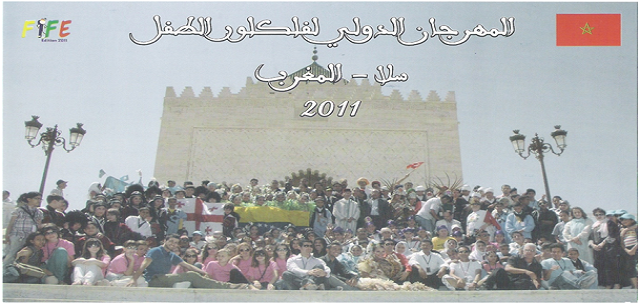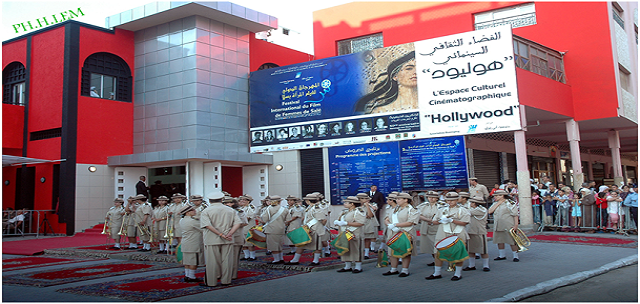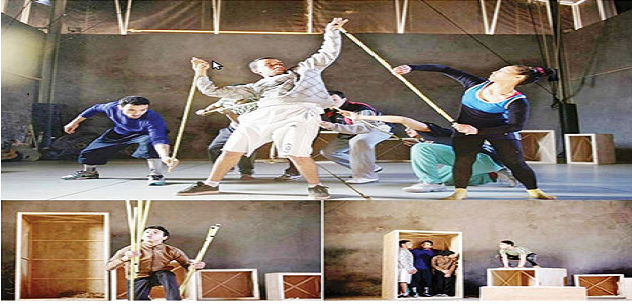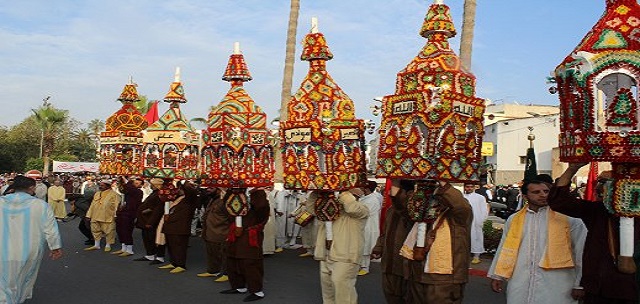Festivals
According to researchers, festivals form the modern side of celebration which characterizes people’s life. It is an expression of a desire for communication, and an opportunity to get away from life’s daily problems, and also an expression of opinion with a larger freedom inside the cultural framework. Moreover it is a social bond and shared happiness with the other.
Therefore, Salé commune organizes a number of diverse festivals with the aim of promoting and preserving the local cultural and artistic heritage, and openness to the external world.
Hence the contribution of groups and foreign artists enriches the cultural field and creates intersections to meet ,to exchange ,and to compare the local artistic development with its counterpart in other cultures.
Through many festivals ,the commune creates systematic fixed dates to promote religious, cultural, artistic and educational values. Also, the implementation of the program of festivals in Salé city is a cultural,economic and touristic investment. Therefore, the commune tries to make out of the activities organized on its territory throughout the year a means of local cultural development which is a feeder of local sustainable development.
Child folklore:

This festival gives the opportunity to children after the end of the school year to live a very rich artistic and educational experience, which enables them to create and revive friendships with children from different world parts. The start of this international festival of child folklore was in 1998,and its first session was set to solidarity with Palestinians through the participation of many children from Palestine.
Women cinema:

The international festival of women movies in Salé started in 2004 by association Abu Regreg. It is a special occasion of “women cinema”, a different attitude of women and men about issues related to woman through her cinema works.
The general program of each session includes an official competition of long movies honoring the cinema of one of the guest countries of the festival, together with a number of acts of honoring, certificates, conferences and workshops under the supervision of specialized professionals and other simultaneous activities. An international arbitration committee which includes creative women from the five continents supervises all the movies presented to the official competition to choose the winners of the festival awards.
“Pirates” festival:

The festival of “pirates”, which is set for arts of circus and travel, is presented with its different components and activities in many neighborhoods and city avenues. It is organized under the supervision of the association “the pirates” and the Moroccan association to help kids in difficult situations.
The festival contributes in weaving links between history, memory, heritage, architecture and modern creativity. It constitutes a distinguished artistic ceremony which contributes in developing the city and promoting a sustainable artistic policy.
Candles convoy:

On the 11th of Rabii 1st of every Hijri year, Salé lives a unique artistic and religious festival, it is the festival of candles or what city inhabitants call “candles turn”. It is a carnival on the occasion of the ceremony of the prophet’s birth. Candles have a special position in it. Candles different from the ones we are used to. They have various shapes and colors, and their weight reaches 50kgs. They are made and shaped of frames of wood, and they take the forms of domes or minarets or the like. All this is inspired from the Islamic architecture. So the shapes are decorated with candles and Islamic expressions like “Allah”, “Blessing of Muhammad”…are written on them.
The candles are taken after Asr Prayer (third prayer) on 11th Rabii Al-Awal, starting from the big market near the house of the candles’ maker in an atmosphere of music, singing, hitting drums..and they pass through the important city avenues till the square of martyrs, then to the house of descendents of the holy prophet ,celebrations go on in this way for one week.
The origin of these celebrations goes back to the Saadi king Ahmed Elmansur Adhahbi who was fascinated by the parade of candles he saw in Istanbul before his reign. So he vows if ever he ruled in Morocco, he would make like that show or more. After his accession to throne,he accomplished his promise ,so the first parade of candles took place in 986 Hijri in Sale city ,and this tradition became a characteristic of the city ever since. Hence Salé city has been used to celebrating the ceremony of the Prophet’s birth through the tradition of candles which they hang in the shrine of the righteous pious Ibn Hassoun on the eve of the ceremony and they are kept there for a period of eleven months. Then one month before the date of the ceremony, they are taken from this shrine to the house of the candles’ maker from the family of Belekbir with the aim of renewing their decoration. Many families followed each other in making these candles like the family of Oubia which appeared 450 years ago, and the families of Elmir , Alhusseini, Elmernissi and Bencheqroon which no longer work in this craft.
The candles of Festival Moulay Abdullah Ben Hassoun are different from other ones. Their frames are made of thick wood in the form of minarets of mosques covered with white paper and decorated with flowers made of wax with various colors, white, red, green and yellow, in an architectural form similar to a beehive and which adopts the magnificent Islamic art.
The festival of candles, which is organized under the patronage of his majesty starts with the show of the convoy of candles which crosses some Salé avenues in the direction of the shrine of Moulay Abdullah Ben Hassan. At night, it is followed by an original traditional celebration “the dance of the candle” with Andalusian music. After that comes the lighting of candles with music tones.
The festival starts after the Asr (3rd prayer) of the day preceding El eid. The convoy meets near the house of the candles’ maker led by the chief of Hssouni corner (zawiya), then “El Tabjia” with their traditional dressing, they cross the city streets carrying candles and accompanied by Sufi and other musician groups.
The convoy crosses the important city avenues passing by Martyrs square (Bab Bouhaja) where the official platform is, to finish its course to the house of the descendents of the holy prophet to organize a traditional celebration much appreciated especially by women and children.
Yet, the end of the show of the convoy of candles does not mean the end of the festival. So after the circuit, a dinner ceremony is made for which all the participants from the noble descendents , women and children alike, are called to join Zawiat Moulay Abdullah Ben Hassan, to finish “The candles dance” with the tones of Andalusian music, and recitations prasing the prophet are sung thereafter.
